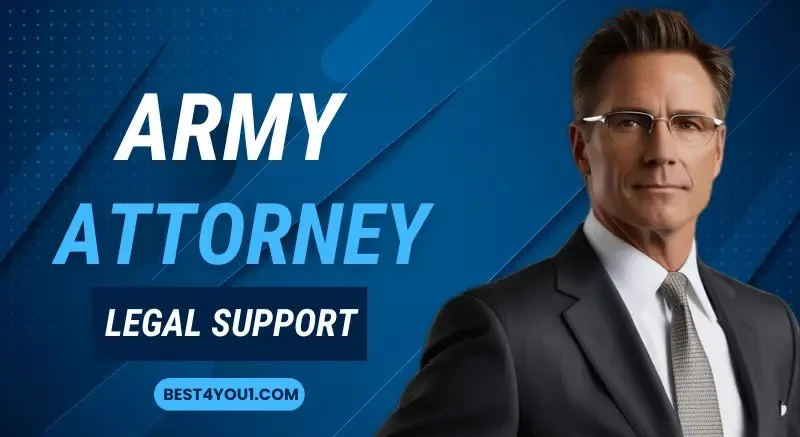Being a service member means knowing your rights. But, dealing with military law can be tough. That’s when an army attorney comes in.
They help you understand military law. They also make sure you get the legal help you need. This includes family law and disciplinary actions.
Having an army attorney is important. They protect your rights and help with the special challenges you face.
Understanding the Role of an Army Attorney
An army attorney helps service members with many legal problems. They know a lot about different legal areas. This helps service members deal with tough military legal issues.
Knowing what an army attorney does is key for military members. These lawyers give important advice and help in special legal situations.
What an Army Attorney Does
An army attorney’s main jobs are:
- They defend in criminal cases, helping with military rule violations.
- They help with family law, like divorce and child custody.
- They help with administrative law, like appeals for discharge upgrades.
- They represent in courts-martial and non-judicial punishment hearings.
Types of Legal Issues Handled
Army attorneys deal with many military legal problems. They make sure service members get all the help they need. Some common issues include:
- Service-related issues like claims for benefits and healthcare disputes.
- Administrative matters like misconduct allegations and disciplinary actions.
- Helping to understand the military justice system.
The Importance of Legal Support for Service Members
Legal support is key for military folks. It keeps your rights safe and helps you get the benefits you deserve. It also helps you understand military rules and your rights, now and later.
Protecting Rights and Benefits
Legal help is vital for your rights as a service member. Problems like unfair discharge or harassment can happen. An army lawyer can help fix these issues.
They also make sure you get the healthcare, education, and retirement benefits you’ve earned. This is thanks to your service.
Addressing Service-related Legal Concerns
Legal issues can come up because of your military service. Having a good lawyer can really help. They explain the Uniform Code of Military Justice (UCMJ) and its impact on you.
It’s important to get legal advice on these matters. This includes help with court-martial cases or appeals for veterans’ benefits. Legal support is crucial for military personnel.
| Legal Support Aspect | Description |
| Protection of Rights | Ensures service members’ rights are upheld, addressing wrongful discharges and discrimination cases. |
| Access to Benefits | Helps navigate legal benefits for veterans, including healthcare and retirement assistance. |
| UCMJ Guidance | Provides legal advice on issues related to the Uniform Code of Military Justice. |
| Legal Representation | Offers representation during court-martial proceedings and veterans’ benefits appeals. |
Common Legal Challenges Faced by Service Members
Service members face many legal challenges. These include family law, courts-martial, and veterans’ benefits. Each area has its own problems that need legal help. If you need help regarding to family then click here.
Family Law Issues
Family law for soldiers is complex. It deals with divorce, custody, and support. Military duties can make these issues harder.
It’s important to know your rights. Military rules can change family law outcomes.
Disciplinary Actions and Courts-Martial
Disciplinary actions can lead to courts-martial. A good defense is key. It protects your career and future.
Having a skilled lawyer in military law is vital. They can help a lot.
Veterans’ Benefits Appeals
Veterans may struggle with benefits appeals. Issues like missing documents or not knowing the rules can cause problems. It’s important to get help to get the benefits you deserve.
| Legal Challenge | Key Issues | Recommended Actions |
| Family Law Issues | Divorce, custody battles, support obligations | Consult experienced family law attorney |
| Disciplinary Actions | Possible courts-martial, misconduct allegations | Engage a knowledgeable courts-martial defense attorney |
| Benefits Appeals | Denials, insufficiencies in documentation | Seek assistance from veterans’ services group |
How to Choose the Right Army Attorney
Finding the right army attorney is very important. It helps you get the legal help you need. Knowing what to look for can really help your case.
Qualifications to Look For
- Experience in military law: This shows they know military issues well.
- Specialization: Find lawyers who know your case type, like family law or court-martial defense.
- Licensing: Check if they are licensed and have special certifications.
Questions to Ask During Consultations
When you meet with lawyers, ask the right questions. Here are some tips:
- What experience do you have with cases like mine?
- How do you handle legal problems and strategies?
- What do you charge, and what are the costs?
Knowing about your lawyer’s skills and answering your questions helps you choose well. A good lawyer can really help your case.
| Criteria | Importance | Examples |
| Experience | High | Ten years in military law practice |
| Specialization | Medium | Focus on family law or court-martial defense |
| Licensing | Essential | State Bar membership and military court admissions |
Resources for Service Members Seeking Legal Help
Getting the right legal help is key for service members. There are many resources out there for you. You can find help in military legal offices, online tools, and support groups.
Military Legal Assistance Offices
Military legal offices offer free or low-cost help. They can guide you on family law, disciplinary actions, and benefits appeals. Their experts know the special challenges you face.
Online Resources and Support Groups
There are many online resources for legal help. Nonprofit websites offer advice on legal issues. Joining support groups for veterans is also helpful. You can find friends and learn from others.
Professional Associations and Networks
Professional groups help with legal issues for service members. They offer support through events, mentorship, and sharing resources. Joining these groups can help you understand military legal matters better.
Conclusion
Army attorneys are very important for service members. They help protect your rights and deal with legal issues. Getting legal help is key to handling military law well.
Legal support means you have experts looking out for you. They make sure you get treated fairly under military rules. This is very important.
Knowing about legal challenges helps you make good choices. Finding the right lawyer is crucial. A good army attorney can help you fight for your rights.
Having a good lawyer gives you confidence. They help make sure your rights and benefits are safe. Use the resources you have and get the legal help you need.
FAQ
What is the role of an army attorney?
An army attorney helps military people with legal issues. They give advice on criminal defense, family law, and UCMJ matters. They make sure your rights are protected and help you in court.
What types of legal issues can an army attorney help with?
An Army attorney encounter numerous legal issues. Family law, such as divorce and custody, as well as disciplinary measures, should be included. They are valuable for helping with discharging upgrades as well as appeals for military benefits.
Is there a reason why legal support is vital for service members?
Key support for service members is in the legal domain. It serves to defend your rights and advantages. An accomplished military lawyer can provide assistance with matters related to Veterans Affairs, discrimination, and unjust termination.
Which army attorney do I choose to meet my requirements?
Find a military law experienced army lawyer. They ought to understand your precise legal difficulties. Talk about how they plan to approach your case, their fees, and their successes in cases that are comparable to yours during the consultation.
What resources are available for service members seeking legal assistance?
Service members can get free or low-cost legal help at Military Legal Assistance Offices. Look online for veteran support groups and professional associations for guidance.

